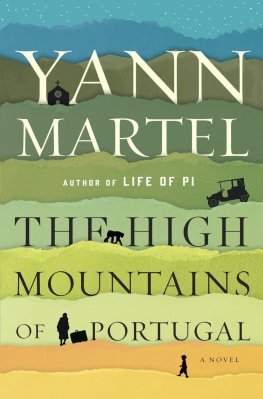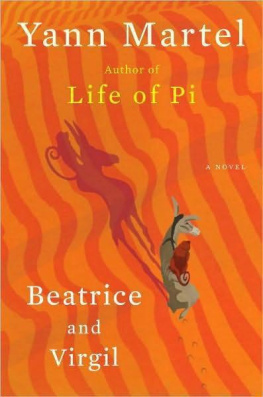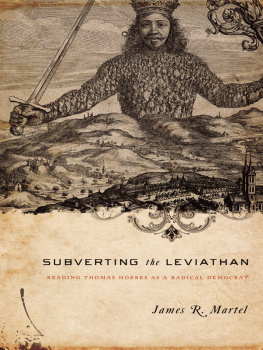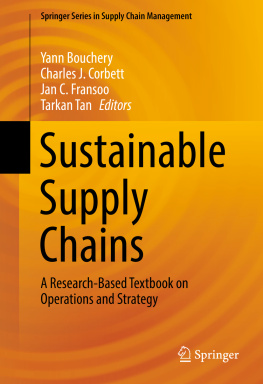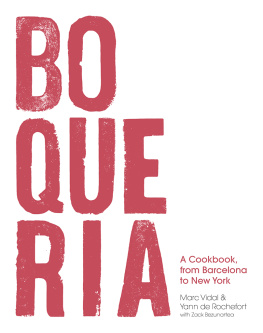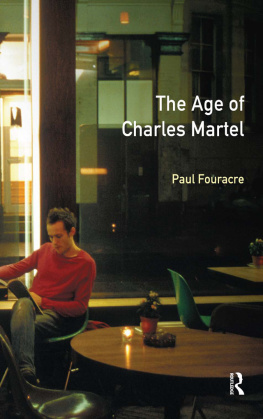Yann Martel - Life of Pi
Here you can read online Yann Martel - Life of Pi full text of the book (entire story) in english for free. Download pdf and epub, get meaning, cover and reviews about this ebook. genre: Detective and thriller. Description of the work, (preface) as well as reviews are available. Best literature library LitArk.com created for fans of good reading and offers a wide selection of genres:
Romance novel
Science fiction
Adventure
Detective
Science
History
Home and family
Prose
Art
Politics
Computer
Non-fiction
Religion
Business
Children
Humor
Choose a favorite category and find really read worthwhile books. Enjoy immersion in the world of imagination, feel the emotions of the characters or learn something new for yourself, make an fascinating discovery.

- Book:Life of Pi
- Author:
- Genre:
- Rating:4 / 5
- Favourites:Add to favourites
- Your mark:
- 80
- 1
- 2
- 3
- 4
- 5
Life of Pi: summary, description and annotation
We offer to read an annotation, description, summary or preface (depends on what the author of the book "Life of Pi" wrote himself). If you haven't found the necessary information about the book — write in the comments, we will try to find it.
Life of Pi — read online for free the complete book (whole text) full work
Below is the text of the book, divided by pages. System saving the place of the last page read, allows you to conveniently read the book "Life of Pi" online for free, without having to search again every time where you left off. Put a bookmark, and you can go to the page where you finished reading at any time.
Font size:
Interval:
Bookmark:
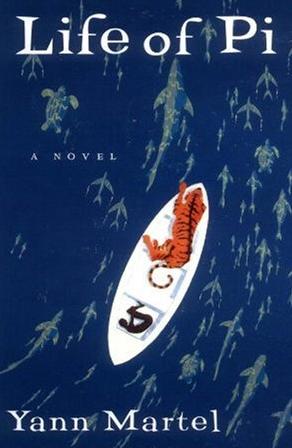 |
Yann Martel
Life of Pi
2001
Like its noteworthy ancestors (Robinson Crusoe, Gullivers Travels, the Ancient Mariner and Moby Dick) Life of Pi is a tale of disaster at sea. Both a boys own adventure (for grown-ups) and a meditation on faith and the value of religious metaphor, it was one of the most extraordinary and original novels of 2002. The only survivor from the wreck of a cargo ship on the Pacific, 16 year old Pi spends 221 days on a lifeboat with a hyena, a zebra (with a broken leg), a female orang-utan and a 450-pound Royal Bengal Tiger called Richard Parker
T his book was born as I was hungry. Let me explain. In the spring of 1996, my second book, a novel, came out in Canada. It didnt fare well. Reviewers were puzzled, or damned it with faint praise. Then readers ignored it. Despite my best efforts at playing the clown or the trapeze artist, the media circus made no difference. The book did not move. Books lined the shelves of bookstores like kids standing in a row to play baseball or soccer, and mine was the gangly, unathletic kid that no one wanted on their team. It vanished quickly and quietly.
The fiasco did not affect me too much. I had already moved on to another story, a novel set in Portugal in 1939. Only I was feeling restless. And I had a little money.
So I flew to Bombay. This is not so illogical if you realize three things: that a stint in India will beat the restlessness out of any living creature; that a little money can go a long way there; and that a novel set in Portugal in 1939 may have very little to do with Portugal in 1939.
I had been to India before, in the north, for five months. On that first trip I had come to the subcontinent completely unprepared. Actually, I had a preparation of one word. When I told a friend who knew the country well of my travel plans, he said casually, They speak a funny English in India. They like words like bamboozle. I remembered his words as my plane started its descent towards Delhi, so the word bamboozle was my one preparation for the rich, noisy, functioning madness of India. I used the word on occasion, and truth be told, it served me well. To a clerk at a train station I said, I didnt think the fare would be so expensive. Youre not trying to bamboozle me, are you? He smiled and chanted, No sir! There is no bamboozlement here. I have quoted you the correct fare.
This second time to India I knew better what to expect and I knew what I wanted: I would settle in a hill station and write my novel. I had visions of myself sitting at a table on a large veranda, my notes spread out in front of me next to a steaming cup of tea. Green hills heavy with mists would lie at my feet and the shrill cries of monkeys would fill my ears. The weather would be just right, requiring a light sweater mornings and evenings, and something short-sleeved midday. Thus set up, pen in hand, for the sake of greater truth, I would turn Portugal into a fiction. Thats what fiction is about, isnt it, the selective transforming of reality? The twisting of it to bring out its essence? What need did I have to go to Portugal? The lady who ran the place would tell me stories about the struggle to boot the British out. We would agree on what I was to have for lunch and supper the next day. After my writing day was over, I would go for walks in the rolling hills of the tea estates.
Unfortunately, the novel sputtered, coughed and died. It happened in Matheran, not far from Bombay, a small hill station with some monkeys but no tea estates. Its a misery peculiar to would-be writers. Your theme is good, as are your sentences. Your characters are so ruddy with life they practically need birth certificates. The plot youve mapped out for them is grand, simple and gripping. Youve done your research, gathering the factshistorical, social, climatic, culinarythat will give your story its feel of authenticity. The dialogue zips along, crackling with tension. The descriptions burst with colour, contrast and telling detail. Really, your story can only be great. But it all adds up to nothing. In spite of the obvious, shining promise of it, there comes a moment when you realize that the whisper that has been pestering you all along from the back of your mind is speaking the flat, awful truth: it wont work. An element is missing, that spark that brings to life a real story, regardless of whether the history or the food is right. Your story is emotionally dead, thats the crux of it. The discovery is something soul-destroying, I tell you. It leaves you with an aching hunger.
From Matheran I mailed the notes of my failed novel. I mailed them to a fictitious address in Siberia, with a return address, equally fictitious, in Bolivia. After the clerk had stamped the envelope and thrown it into a sorting bin, I sat down, glum and disheartened. What now, Tolstoy? What other bright ideas do you have for your life? I asked myself. Well, I still had a little money and I was still feeling restless. I got up and walked out of the post office to explore the south of India.
I would have liked to say, Im a doctor, to those who asked me what I did, doctors being the current purveyors of magic and miracle. But Im sure we would have had a bus accident around the next bend, and with all eyes fixed on me I would have to explain, amidst the crying and moaning of victims, that I meant in law; then, to their appeal to help them sue the government over the mishap, I would have to confess that as a matter of fact it was a Bachelors in philosophy; next, to the shouts of what meaning such a bloody tragedy could have, I would have to admit that I had hardly touched Kierkegaard; and so on. I stuck to the humble, bruised truth.
Along the way, here and there, I got the response, A writer? Is that so? I have a story for you. Most times the stories were little more than anecdotes, short of breath and short of life.
I arrived in the town of Pondicherry, a tiny self-governing Union Territory south of Madras, on the coast of Tamil Nadu. In population and size it is an inconsequent part of Indiaby comparison, Prince Edward Island is a giant within Canadabut history has set it apart. For Pondicherry was once the capital of that most modest of colonial empires, French India. The French would have liked to rival the British, very much so, but the only Raj they managed to get was a handful of small ports. They clung to these for nearly three hundred years. They left Pondicherry in 1954, leaving behind nice white buildings, broad streets at right angles to each other, street names such as rue de la Marine and rue Saint-Louis, and kepis, caps, for the policemen.
I was at the Indian Coffee House, on Nehru Street. Its one big room with green walls and a high ceiling. Fans whirl above you to keep the warm, humid air moving. The place is furnished to capacity with identical square tables, each with its complement of four chairs. You sit where you can, with whoever is at a table. The coffee is good and they serve French toast. Conversation is easy to come by. And so, a spry, bright-eyed elderly man with great shocks of pure white hair was talking to me. I confirmed to him that Canada was cold and that French was indeed spoken in parts of it and that I liked India and so on and so forththe usual light talk between friendly, curious Indians and foreign backpackers. He took in my line of work with a widening of the eyes and a nodding of the head. It was time to go. I had my hand up, trying to catch my waiters eye to get the bill.
Then the elderly man said, I have a story that will make you believe in God.
I stopped waving my hand. But I was suspicious. Was this a Jehovahs Witness knocking at my door? Does your story take place two thousand years ago in a remote corner of the Roman Empire? I asked.
Font size:
Interval:
Bookmark:
Similar books «Life of Pi»
Look at similar books to Life of Pi. We have selected literature similar in name and meaning in the hope of providing readers with more options to find new, interesting, not yet read works.
Discussion, reviews of the book Life of Pi and just readers' own opinions. Leave your comments, write what you think about the work, its meaning or the main characters. Specify what exactly you liked and what you didn't like, and why you think so.

